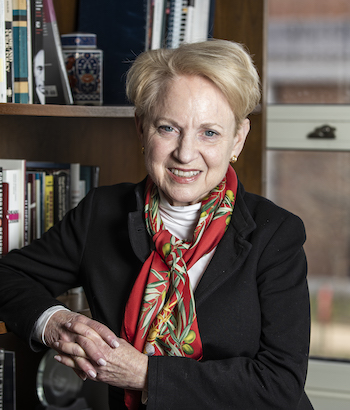
She’s newly retired, but the honors continue to pour in for in George Mason University’s Laurie O. Robinson following an exemplary career of service in the criminal justice field.
Robinson, who spent the past nine years at Mason as a Clarence J. Robinson Professor of Criminology, Law and Society before stepping aside from her teaching duties at the end of the just-completed spring semester, has been selected by the American Society of Criminology as the recipient of the 2021 Herbert Bloch Award, which recognizes “outstanding service contributions to the American Society of Criminology and to the professional interests of criminology.”
Robinson, who will continue to be involved in an emerita role with Mason’s Center for Evidence-Based Crime Policy in the Department of Criminology, Law and Society within the College of Humanities and Social Sciences, will be formally recognized at the ASC annual meeting in Chicago in November.
“I am very honored and really thrilled,” she said. “To be recognized by colleagues in the criminology field makes me feel extremely honored and touched.”
It’s just the latest honor bestowed upon Robinson, who co-chaired President Obama’s White House Task Force on 21st Century Policing and twice served as an Assistant Attorney General for the U.S. Department of Justice’s Office of Justice Programs before coming to Mason.
Cynthia Lum, University Professor of Criminology, Law and Society and the director of the CECP, nominated Robinson for the award.
“Laurie Robinson’s contributions to criminal justice cannot be overstated,” said James Willis, chair of the Department of Criminology, Law and Society. “Her career has been devoted to a vision for criminal justice reform founded on rigorous scientific evidence, and one that advances fundamental democratic values such as justice, fairness and equality.”
Willis lauded Robinson for her ability to “tirelessly and expertly” navigate the often-perilous waters of the policy and academic worlds to achieve the best outcomes possible.
“She brought this same vision and work ethic to the Department of Criminology, Law and Society, and particularly to its new MS program in Criminal Justice,” Willis said. “She was instrumental in helping create an innovative graduate learning experience, and her teaching of the capstone course introduced CLS students to the possibilities and pitfalls of meaningful reform. An important feature of her impressive legacy will include shaping the next generation of criminal justice leaders. I can think of no one more deserving of this award.”
Robinson said she’s long taken pride in that ability to have all parties keep the big picture in mind.
“I’ve always been in the policy world, but I cherish my relationships with academia,” she said.
